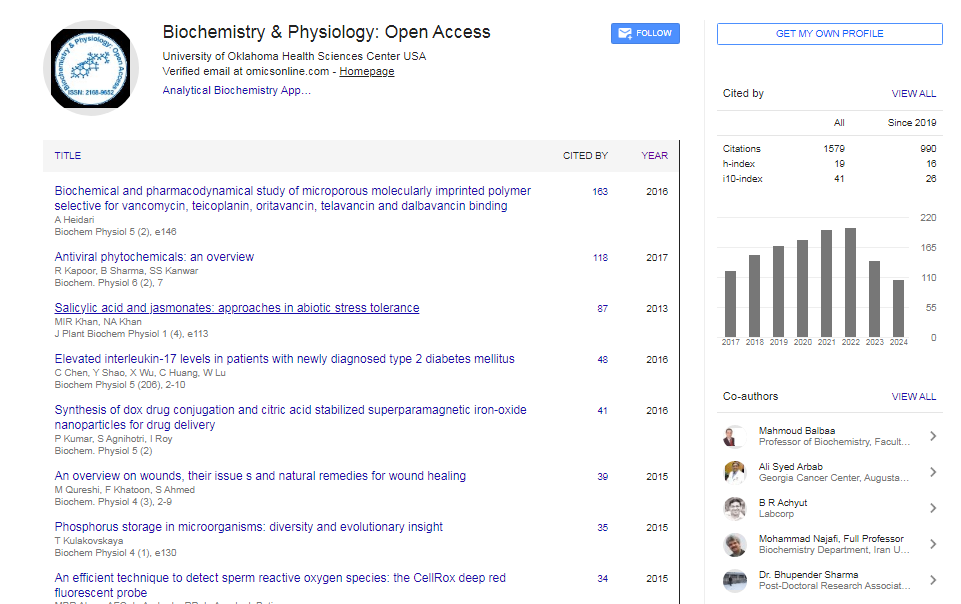Research Article
An Indigenous Plant Bael (Aegle Marmelos (L.) Correa) Extract Protects Against the Doxorubicin-Induced Cardiotoxicity in Mice
| Ganesh Chandra Jagetia* and Ponemone Venkatesh | |
| Department of Zoology, Mizoram University, Aizawl-796 004, India | |
| Corresponding Author : | Ganesh Chandra Jagetia Department of Zoology Mizoram University, Tanhril, Aizawl-796 004, Mizoram, India Tel: 011-389-2330724/2330227 E-mail: gc.jagetia@gmail.com |
| Received: April 20, 2015; Accepted: May 13, 2015; Published: May 20, 2015 | |
| Citation: Jagetia GC, Venkatesh P (2015) An Indigenous Plant Bael (Aegle Marmelos (L.) Correa) Extract Protects Against the Doxorubicin-Induced Cardiotoxicity in Mice. Biochem Physiol 4:163. doi:10.4172/2168-9652.1000163 | |
| Copyright: © 2015 Jagetia GC, et al. This is an open-access article distributed under the terms of the Creative Commons Attribution License, which permits unrestricted use, distribution, and reproduction in any medium, provided the original author and source are credited. | |
| Related article at Pubmed, Scholar Google | |
Abstract
Doxorubicin (DOX) is an effective antineoplastic agent widely used for the treatment of various cancers; however, its clinical use is limited due the induction of dose-dependent toxicity in the hearts of patients receiving this drug. Therefore any agent that can reduce its myocardial toxicity will be very useful in clinics. The effect of hydroalcoholic extract of bael, Aegle marmelos (AME), a medicinal herb, was evaluated for its ability to reduce doxorubicin induced cardiotoxicity in mice. Based on our earlier studies 350 mg/kg AME was given to mice injected with a single dose of 15 mg/kg DOX. DOX treatment showed a significant elevation in the glutamic pyruvic transaminase (GPT), glutamic oxaloacetic transaminase (GOT), creatine kinase (CK-MB) and lactate dehydrogenase (LDH) activities in serum of animals killed at 30 h after DOX treatment, indicating acute cardiotoxicity. Treatment of mice with AME before DOX administration significantly reduced the serum levels of CK-MB, LDH, GPT, and GOT indicating that AME protected mice against the DOX-induced acute cardiotoxicity. Pretreatment of mice with AME significantly reversed the DOX-induced decline in the antioxidant status and elevated lipid peroxidation in the myocardial tissue. In a separate experiment the effect of AME against the doxorubicin-induced cardiotoxicity was also studied by evaluating electrocardiogram and myocardial biopsies in mice administered with DDW or AME once daily for 5 consecutive days before exposure to a weekly dose of 5 mg/kg b. wt. DOX for 3 consecutive weeks. DOX treatment caused an increase in the ST interval, which was used as a measure of cardiotoxicity. AME treatment significantly reduced the ST interval indicating protection against DOX-induced chronic cardiotoxicity. The histopathological examination of heart revealed degeneration of myofibrils with mild necrosis in DOX treated group, whereas AME pretreatment drastically reduced these events in the cardiac tissue. Intraperitoneal injection of 1.25 mg/kg DOX once daily for 9 consecutive days significantly improved the survival of mice bearing Ehrlich ascites carcinoma (EAC). Treatment of EAC with 350 mg/kg AME alone did not affect the anticancer activity of DOX since AME did not alter the tumor cell growth, the median and average survival times of tumor bearing mice. The present study demonstrates that AME protects mice against the DOX-induced acute and chronic cardiotoxicity without interfering with the antineoplastic activity of DOX.

 Spanish
Spanish  Chinese
Chinese  Russian
Russian  German
German  French
French  Japanese
Japanese  Portuguese
Portuguese  Hindi
Hindi 